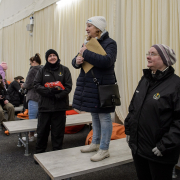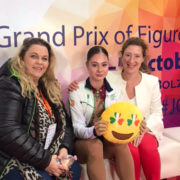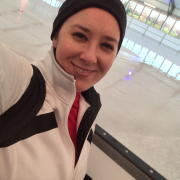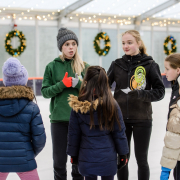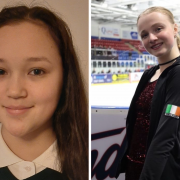Women In Sport Week: Active Participation
To mark Women In Sport Week (6-12 March), the Ice Skating Association of Ireland asked the women who make ice skating happen in Ireland a series of questions to hear about the challenges and unique culture of the sport within the country.
The theme for today is Active Participation. The ISAI’s Emerald Skate Learn To Skate programme is the great success story of Irish skating with demand continuing to grow year on year for the courses. It is a programme that also happens to be administered, taught and participated in almost entirely by women. ISAI CEO Karen O’Sullivan shares her thoughts on why women are so instrumental in ice skating in Ireland.
You have been involved in the Emerald Skate programme since its inception and it has always had very high percentage of female participation. What is it about ice skating that appeals to women so much as a sport?
O’Sullivan: Gosh, the Emerald Skate programme has to be my highlight of skating in Ireland. Yes, it is predominantly women, but we encourage the boys too. I think it’s the challenge, the sense of accomplishment on a medium so outside our comfort zone that allows women to realise our freedom and self-reliance. Skating is all you. When the skater stands on the ice and pushes forward, she is in control. It’s a space for women to express themselves and discover their inner strengths. When a women puts on a pair of skates she becomes a skater. There is no gender divide.
Women in sport have historically faced barriers to participation and recognition. Have you experienced any challenges or obstacles in ice skating in Ireland because of your gender?
O’Sullivan: I am sure there have been, but with the perseverance that skating has taught me I have ignored them. We don’t use the #UpAgain hashtag in ice skating for no reason! Our sport develops a strong inner core to face and overcome any obstacle life puts in front of us.
What do you feel are the positive aspects of being a woman involved in ice skating in Ireland?
O’Sullivan: Respect. Respect from and for each other. We know the mental and physical demands the sport requires from putting on your first pair of skates to stepping onto World Championship ice, and everything in between. We admire and support each other. Even though we might not get the respect, understanding and recognition from those not directly involved in our sport, it is empowering to see women supporting women at all ages, celebrating each other’s accomplishments. Some of my best moments have been when a younger skater lands her first axel jump and her faces lights up with the realisation she ian do It. Sometimes it’s the child that lets go of the penguin and moves freely to the centre ice. The parent’s face as they realise their child can cope with any adversary.
Representation and visibility are important issues in all areas of life, including sport. What would you like to see happen in the world of ice skating to encourage more women to participate and succeed ?
O’Sullivan: Two things.
One: The perception that the sport is “fluffy” changes. There is nothing soft about the falls, the cuts, the blisters, the pain, the heart-breaking frustration waiting for it to click, the cold, the unsocial hours, the isolation, the core strength and fitness that is need, the mental and physical strength for endurance that is necessary. Did I mention the cold? And through all this the skater has to give the appearance that it is easy. It is not. I would like credit to be given for what the skater does to effortlessly glide across the ice on a steel blade no thicker than 4.8mm!
Two: Meaningful support for access, to give the girls and the boys more ice in Ireland.
